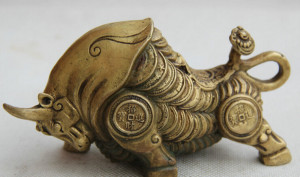
China on the Horns of a Trilemma
The “economic trilemma” or “impossible trinity” is more usually known as the Mundell-Flemming model by economists, and it was Nobel prize-winning Canadian economist Robert Mundell who is usually credited with first describing it in the early sixties. The theory states that a country cannot simultaneously have all three of:
- A fixed FX rate
- Independently set interest rates
- Free movement of capital
In the modern era, post-1973, the major developed countries have gone with 2 and 3 and given up on 1. Hong Kong and several of the middle eastern oil exporters have decided that 1 and 3 suits them better – they have pegged currencies, but as I noted in a recent post they have lost 2, the ability to set interest rates independently. The last trilemma possibility is to have 1 and 2 and to sacrifice 3 – not a popular choice because giving up the free movement of capital partially cuts off a country from the rest of the world’s economy, but in times of market crisis capital controls are sometimes introduced. When you want to halt a currency collapse with a fixed peg and not put interest rates up to altitude-sickness levels, the economic trilemma sais that you have to restrict the free movement of capital (as in Iceland in the 2008 crisis, for example).
The trilemma is a creating particular challenges for China in the current environment. Until recently China was going with 2 and a half measure each of 1 and 3. The FX rate isn’t fixed, but neither is it freely floating. Capital can and does flow in and out of China all the time, but there are legal restrictions on the volume and periodical crackdowns on the grey-market circumventors. At least China still had 2: the ability to set interest rates according exclusively to what suited the domestic economy. But in recent months, the economic data has been universally poor but the PBOC has been reluctant to continue the cutting cycle in fear of causing a sell-off in the renminbi. In an attempt to grab a larger portion of the impossible trinity cake, Chinese leaders are unfortunately having to settle with just half a slice of each section.
Louis Gave wrote a long and very thoughtful piece on China’s struggle on the horns of this trilemma last week. If you subscribe to Gavekal’s excellent research you have probably read it already, if not then you can find it here, just after John Mauldin’s introduction. It’s well worth a read for all serious China watchers.
Receive updates by email





On Bubbles and Bitcoin
/0 Comments/in blog, Finance and economics, Financial Markets, Investing /by Andy+China’s Balancing Act
/0 Comments/in blog, Economics, Uncategorized /by Andy+FAANGs for the Memories
/0 Comments/in blog, Financial Markets /by Andy+